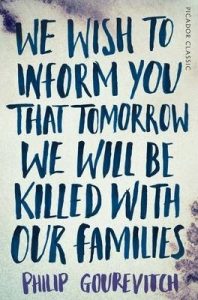

The book itself was easy to read, surprisingly, since it dealt with some of the most unfathomable human situations to have transpired in recent history. Chief among them is the UN and the international community as a whole, who are perhaps the most responsible, I think, for ignoring the genocide and facilitating the massacres that followed it. I started this book knowing the Rwandan genocide was basically composed of Hutus killing Tutsis in the mid-1990s, and ended it with a radically transformed mindset toward so many institutions and people and ideas. We Wish to Inform You That Tomorrow We Will Be Killed with Our Families is the winner of the National Book Critics Circle Award for Nonfiction. Can a country composed largely of perpetrators and victims create a cohesive national society? This moving contribution to the literature of witness tells us much about the struggle everywhere to forge sane, habitable political orders, and about the stubbornness of the human spirit in a world of extremity.

Through intimate portraits of Rwandans in all walks of life, he focuses on the psychological and political challenges of survival and on how the new leaders of postcolonial Africa went to war in the Congo when resurgent genocidal forces threatened to overrun central Africa. With keen dramatic intensity, Gourevitch frames the genesis and horror of Rwanda's "genocidal logic" in the anguish of its aftermath: the mass displacements, the temptations of revenge and the quest for justice, the impossibly crowded prisons and refugee camps. A Tutsi pastor, in a letter to his church president, a Hutu, used the chilling phrase that gives Philip Gourevitch his title. Though the killing was low-tech-largely by machete-it was carried out at shocking speed: some 800,000 people were exterminated in a hundred days. This remarkable debut book chronicles what has happened in Rwanda and neighboring states since 1994, when the Rwandan government called on everyone in the Hutu majority to murder everyone in the Tutsi minority. An unforgettable firsthand account of a people's response to genocide and what it tells us about humanity.


 0 kommentar(er)
0 kommentar(er)
